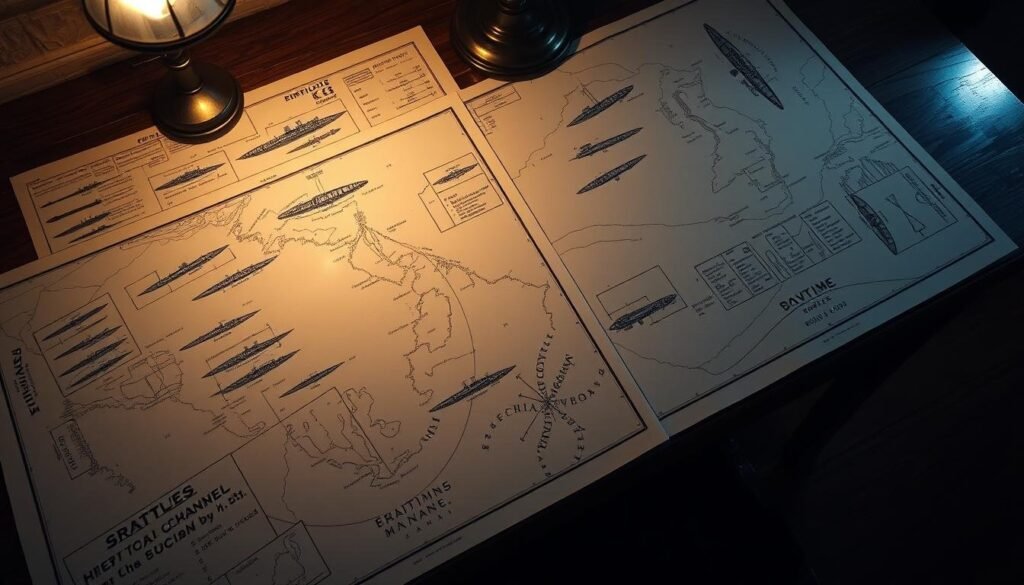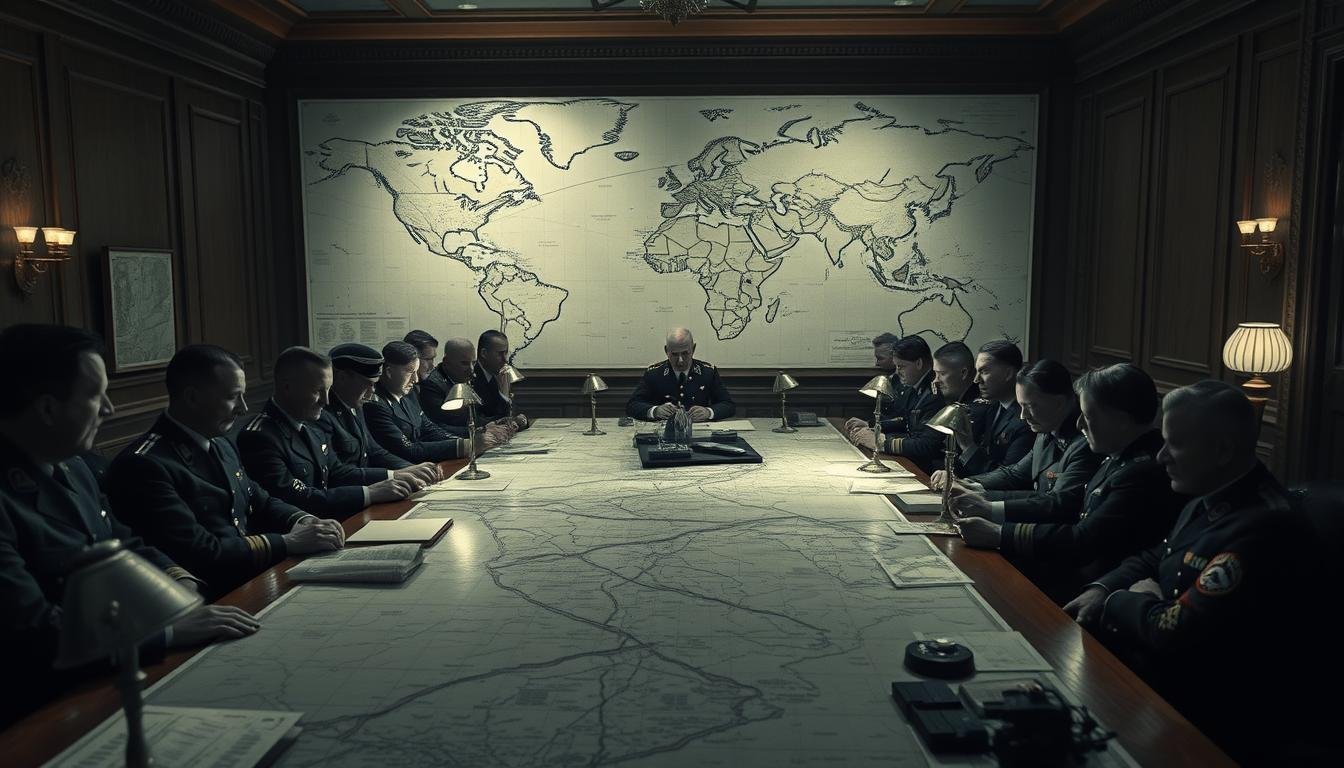Why Didn’t Hitler Invade England? You might wonder about the strategic decisions made by Adolf Hitler during World War II. Especially about Nazi Germany’s plans for England.
The non-invasion of England was a key moment in the war. It was influenced by military, logistical, and strategic factors related to Hitler’s England invasion plans.
As you read this article, you’ll learn about the historical context and World War2 strategy behind this decision.
Understanding this period can teach us about the complexities of warfare and international relations.
Contents
- 1 Hitler’s Initial Plans for Britain
- 2 Operation Sea Lion: The Planned Invasion of England
- 3 The Battle of Britain: RAF’s Crucial Defense
- 4 Why Didn’t Hitler Invade England? Naval Superiority Issues
- 5 Weather, Timing, and Other Practical Obstacles
- 6 Conclusion: Why Didn’t Hitler Invade England?
- 7 FAQ
- 7.1 What was Operation Sea Lion?
- 7.2 What was the significance of the Battle of Britain?
- 7.3 How did weather conditions affect the planned invasion of England?
- 7.4 What were the initial plans for invading Britain?
- 7.5 What role did the Luftwaffe play in the Battle of Britain?
- 7.6 How did the outcome of the Battle of Britain impact Hitler’s decision-making process?
Hitler’s Initial Plans for Britain
Hitler’s plans to invade Britain were part of a bigger strategy for Europe. He thought Britain would agree to peace after France fell. This would avoid a full invasion.
But when Britain refused to give up, Hitler looked at invasion seriously. He studied Britain’s defenses to find weak spots. The plan included military power and smart tactics, like airborne troops and sea landings.
Hitler also thought about the German navy and air control. The Luftwaffe was key to winning the skies. This was vital for a successful invasion.
The plans had several parts:
- Securing air superiority over the British Isles
- Conducting amphibious landings along the British coast
- Utilizing airborne troops to secure key objectives
These plans show Hitler’s strategic thinking. They reflect the complexity of attacking a strong military power like Britain.
Operation Sea Lion: The Planned Invasion of England
In the summer of 1940, Hitler’s Germany started planning Operation Sea Lion. This plan was to invade England. It was a key part of Germany’s military strategy after France fell, aiming to quickly win the war by beating Britain.
Initial Planning and Objectives
The first steps in planning Operation Sea Lion involved studying British defenses. Nazi military planners looked for weak spots along the English coast. They wanted to find areas that would help them land a big invasion force. The main goal was to get a strong hold on English soil, then attack deeper into the country.
Landing Zones and Troop Movements
The invasion zones for Operation Sea Lion were from Lyme Bay to the Isle of Wight. The main attack would be on beaches between Brighton and Eastbourne. Germany was getting ready to move over 200,000 soldiers across the English Channel.
Thinking about the number of troops and the logistics needed gives you an idea of the operation’s size. The success of the invasion depended on winning air battles against the RAF and safely crossing the Channel. But, not winning air superiority during the Battle of Britain made the invasion very hard.
Looking into Operation Sea Lion shows us the strategic choices made by the Nazi leaders. The operation’s complexity and the challenges it faced show how hard it was to invade England. This was a big problem for Hitler’s Germany.
The Battle of Britain: RAF’s Crucial Defense
Exploring the Battle of Britain reveals key decisions that led to the Royal Air Force’s (RAF) victory. This air campaign between the RAF and the German Luftwaffe was a turning point in World War II.
The Luftwaffe’s mistakes were crucial in the battle’s outcome. At first, they aimed to destroy RAF airfields and radar stations. This could have given them a big advantage.
Luftwaffe’s Strategic Errors
The Luftwaffe’s change in strategy was costly. They moved from targeting RAF airfields to cities. This let the RAF recover and launch a strong counterattack.
Targeting Shifts and Consequences
The Luftwaffe’s shift in targets had big consequences. They started the Blitz, bombing cities. This caused many civilian casualties but also eased pressure on the RAF.
The Battle of Britain’s impact went beyond the immediate fight. It stopped Germany from getting air superiority, key for invading England. The RAF’s defense meant Germany never launched Operation Sea Lion, the invasion plan.
In conclusion, the Battle of Britain was a key moment in World War II. It showed the power of air power and strategic decisions. The RAF’s defense saved Britain from invasion and changed the war’s direction.
The German Navy’s limitations stopped Hitler from invading England. Looking into the Nazi plans, we see that having a strong navy was key.
The German Navy, or Kriegsmarine, had big challenges. They lost ships in battles before.
Losses in the Norwegian Campaign
The Norwegian Campaign in April 1940 was tough for the German Navy. The Kriegsmarine lost several key ships, including the heavy cruiser Blücher. This loss hurt their power a lot.
Inadequate Landing Craft
The German forces didn’t have enough landing craft. The lack of suitable landing craft made it hard to move troops and gear. This was a big problem for Operation Sea Lion, the planned invasion of England.
Some big challenges for the German Navy were:
- Not enough landing craft for troops and gear
- Losses in the Norwegian Campaign
- Less naval power than the British Royal Navy
The German Navy’s problems, along with the strong British Royal Air Force (RAF) in the Battle of Britain, made invasion unlikely. The Nazi plans show the German Navy’s limits were a big problem.

Hitler decided not to invade England because of naval issues. The risks of a big amphibious attack were too high. The German Navy’s weaknesses were a big part of this decision.
Weather, Timing, and Other Practical Obstacles
Weather and timing were big hurdles for Hitler’s plans to invade England. The British weather was very unpredictable, making it hard for any invasion. The German military had to think about how the weather would affect their plans, like the sea and landing sites.
The timing of the invasion was also key. Hitler’s forces needed good weather to succeed. But the British summer of 1940 was full of surprises, making it hard to pick the right time.
There were also big logistical challenges. The Germans had to move a huge amount of troops, vehicles, and gear across the English Channel. This was tough, especially with the strong British Navy and Air Force.
The English coastline’s terrain added more problems. The Germans had to find good places to land, considering the tides, defenses, and cliffs. These details were important in Hitler’s decision to invade England.
In the end, bad weather, timing issues, and logistics stopped Hitler’s invasion plans. This was a big moment in World War 2. It let Britain stay a key base for the Allies.
Conclusion: Why Didn’t Hitler Invade England?
You now know why Hitler decided not to invade England during World War II. The Battle of Britain and Operation Sea Lion are key to understanding this. These events show how complex and challenging an invasion would have been.
The Battle of Britain was a turning point in the war. RAF pilots’ bravery and Hitler’s decisions led to the cancellation of Operation Sea Lion. Learning about Operation Sea Lion helps us see the military planning and decision-making of that time.
Reflecting on World War II, the decision not to invade England was crucial. This decision is still studied by historians and strategists today. It teaches us important lessons for the future.
See Also: Was Hitler Time Magazine’s Man of the Year?
FAQ
What was Operation Sea Lion?
Operation Sea Lion was the code name for Nazi Germany‘s plan to invade England during World War II. It involved using military power and smart tactics.
What was the significance of the Battle of Britain?
The Battle of Britain was a key air battle between the Royal Air Force (RAF) and the German Luftwaffe. It greatly affected the war’s strategy and led to the cancellation of the invasion plans.
How did weather conditions affect the planned invasion of England?
The British weather was a big challenge for any invasion force. It played a role in the decision not to invade.
What were the initial plans for invading Britain?
Hitler and the Nazi High Command first thought about invading Britain. They planned to use military strength and smart tactics, based on their strategy for Europe and their view of the British military.
What role did the Luftwaffe play in the Battle of Britain?
The Luftwaffe, Germany’s air force, fought a strategic air battle against the RAF. But their mistakes and the RAF’s defense strategies led to their failure.
How did the outcome of the Battle of Britain impact Hitler’s decision-making process?
The Battle of Britain’s outcome, along with naval issues and practical problems, greatly influenced Hitler’s choice not to invade England.

Jayceon Schaefer, a social worker from Wailuku, Hawaii, is passionate about history. He created HitlerStory.com to share his deep interest in Adolf Hitler and explore complex historical topics through writing.

